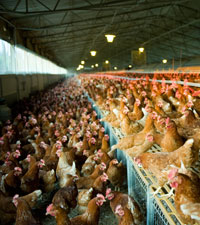United Kingdom, Australia Take Action to Fight Superbugs
 The United Kingdom and Australia are looking to curb the overuse of antibiotics on industrial farms. |
Across the Atlantic, the British Parliament recently held a debate on the use of antibiotics in food animal production. Conservative Member of Parliament Zac Goldsmith spoke at length on the worrying connection between their overuse in agriculture and the rise of drug-resistant bacteria in humans, warning that "by overusing antibiotics, we risk ruining for future generations one of the great discoveries of our species."
Additionally, the United Kingdom's Department of Health is currently developing a five-year antimicrobial resistance plan. Goldsmith called on the government to include in this strategy a legally binding timetable to "restrict the prophylactic use of antibiotics, to limit the prescription and use of antimicrobials for the herd treatment of animals to cases in which a vet has assessed that there is a clear clinical justification and to limit the use of critically important antibiotics to cases in which no other type of antimicrobials will be effective."
Australia's Senate is expected to launch an inquiry in March into an expert committee's 1999 recommendations to combat antibiotic resistance in that country. Until now, the 22 recommendations listed in the committee's report have largely been ignored. "We've lost over a decade now in terms of our response," lamented Greens Senator Richard Di Natale.
Peter Collignon, member of the expert committee and professor of infectious diseases at the Australian National University, cited a lack of political will to stand up to the animal agriculture industry on the issue. Hopefully, the upcoming inquiry will push the Australia government to move forward on the committee's recommendations and take action to combat the rise of superbugs.
These recent steps, coupled with progress to curb antibiotic overuse in several EU countries including Germany, Denmark and the Netherlands, show a growing global consensus on this issue. With more than 40 years of scientific and economic literature on how antibiotic use in food animal production contributes to the growing health crisis of antibiotic resistance, the United States must join the fight. To protect public health, Congress and the Obama administration can start by standing up to Big Ag.











